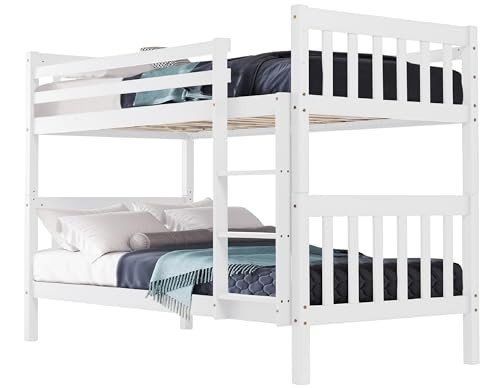
The Ultimate Guide to Kids Bunk Beds: Maximizing Space and Fun
With the rise of vertical living and smaller sized spaces, the appeal of bunk beds has actually soared amongst households. Bunk beds not only offer a useful sleeping service, particularly in shared rooms, however they also bring a component of enjoyable into a kid's life. This thorough guide looks into the functions, advantages, and considerations of kids' bunk beds, making it simpler for parents to pick the right bed for their children.
Functions of Kids Bunk Beds
Bunk beds are flexible pieces of furnishings that serve more than a single purpose. Here are some essential functions to consider:
| Feature | Description |
|---|---|
| Material | Bunk beds can be built from wood, metal, or a mix of both, offering differing levels of sturdiness and style choices. |
| Safety Features | Many bunk beds on sale beds come equipped with guardrails, secure ladders, and capped assistances for security, particularly important for children. |
| Design Variety | Choices vary from timeless designs to modern-day styles, ensuring a match for any room decoration. |
| Space-Efficiency | childrens bunk beds uk beds utilize vertical space, making them perfect for smaller sized spaces. |
| Convertible Options | Some designs can be converted into 2 different beds, offering versatility as kids grow. |
| Storage Solutions | Some bunk beds come with integrated storage drawers or racks, assisting to keep the space arranged. |
Advantages of Kids Bunk Beds
Purchasing a bunk bed comes with a number of benefits:
- Space Saving: Bunk beds make the most of floor space, permitting for more backyard or storage options.
- Enjoyable Factor: With a bunk bed, kids belong that promotes imagination and companionship throughout pajama parties or playdates.
- Cost-Effective: Instead of buying 2 different beds, a bunk bed can accommodate two kids at the same time, saving cash in the long run.
- Versatility: Many bunk beds can be taken apart or converted into twin beds, making them a long-lasting financial investment as children's needs alter.
- Social Interaction: bunk bed on sale beds encourage household bonding and friendships, providing an inviting space for kids to share stories and laughter.
Factors to consider When Choosing a Kids Bunk Bed
When choosing the perfect bunk bed for a kid, parents ought to take into consideration various elements:
- Safety Standards: Ensure that the bunk bed adhere to security guidelines and comes with essential security features.
- Age Appropriateness: Different designs cater to different age groups. For instance, traditional bunk beds may not appropriate for more youthful children.
- Room Dimensions: Measure the bedroom to ensure the bunk bed fits appropriately, allowing for space to move conveniently.
- Weight Capacity: Consider the weight load of each bed and ensure it accommodates the kid's weight easily.
- Design Preferences: Letting children get involved in the choice process can help them feel more ecstatic about their brand-new bed.
Kinds Of Kids Bunk Beds
childrens bunk beds beds come in different designs and setups to match different requirements:
| Type | Description |
|---|---|
| Requirement Bunk Bed | A classic design with one bed stacked on top of another, normally utilizing a ladder to access the leading bunk. |
| L-Shaped Bunk Bed | Features 2 bunk beds linked in an L-shape, typically more large and suitable for kids sharing a space however needing a bit more space. |
| Triple Bunk Bed | Consists of three stacked beds, ideal for optimizing sleeping arrangements in really limited areas. |
| Loft Bed | A raised bed with space beneath that can act as a backyard, study corner, or additional storage. |
| Futon Bunk Bed | Combines a bunk bed on the top with a futon or couch underneath, making it great for pajama parties and maximizing room use. |
| Convertible Bunk Bed | Can be separated into 2 specific beds, using versatility as kids's needs alter. |
Taking Care Of Kids Bunk Beds
Maintaining bunk beds is important for making sure durability and security. Here are some simple care practices:
- Regular Inspections: Check the bed frequently for loose screws and tightened bolts to ensure stability.
- Tidiness: Keep bed linen tidy and fresh, rotating bed mattress for even use.
- Guardrails: Ensure guardrails are secure and in location, specifically if kids tend to move a lot in their sleep.
- Air Circulation: Ensure the bed has sufficient airflow, avoiding wetness buildup that can lead to mold or mildew.
Frequently Asked Questions About Kids Bunk Beds
Q1: At what age can a kid securely utilize a bunk bed?
A1: Generally, children aged 6 and older are thought about safe to use the upper bunk due to the height and stability elements included.
Q2: Can I place a bunk bed near a window?
A2: It is a good idea to prevent placing a bunk bed near windows to lower the threat of falling or injuries.
Q3: Are bunk beds safe for younger children?
A3: While some contemporary bunk beds come with safety functions accommodating more youthful children, it is generally advised to wait until they are older, usually over 6 years.
Q4: What is the common weight limitation for leading bunks?
A4: Weight limitations vary by design but usually vary from 150 to 250 pounds. Always describe the manufacturer's specs.
Q5: How often should I examine the bunk bed's safety features?
A5: It is recommended to carry out a safety check every few months or whenever you observe any indications of wear.
Kids' bunk beds serve as a tactical option for families aiming to optimize space while supplying an enjoyable and engaging sleeping environment for their kids. With a variety of options offered-- from standard styles to loft beds-- parents have the freedom to choose something that fulfills their household's particular needs. By considering important factors such as safety, space viability, and their kids's preferences, parents can make an informed choice, guaranteeing that each kid is thrilled about bedtime while taking advantage of an efficient room.







